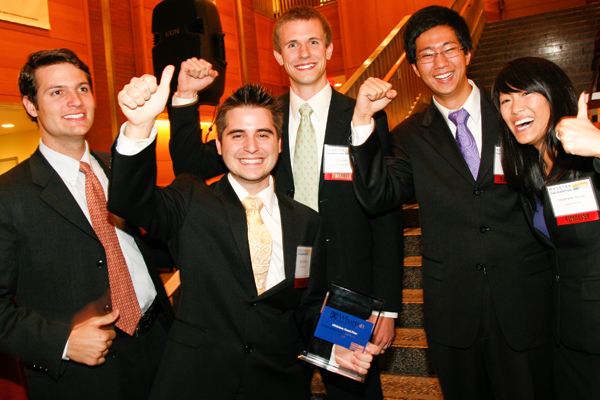May 3, 2010
JHU students win $20,000 grand prize in Wharton competition
Students stand tall among 231 contestants in business plan competition

The prize-winning Cortical Concepts team: Christopher Komanski, Nicolas Martinez, Evan Luxon, Jason Hsu and Stephanie Huang. Photo: Lionel Nicolau, Courtesy University of Pennsylvania
A Johns Hopkins student team that developed a system to make spinal surgery more successful in patients with osteoporosis has won the $20,000 Michelson Grand Prize in the 2010 Wharton Business Plan Competition at the University of Pennsylvania. Since it was launched in 1998, this major competition has drawn more than 150 student teams annually. This year, 231 teams entered.
The winning team, called Cortical Concepts, has filed a provisional patent not only for its device but for its method of applying an anchor—similar to a drywall anchor used in home building—to bone screws used in spinal surgery. Osteoporotic patients have softer or more brittle bones, which can allow spinal surgical screws to pull out, leading to a risky revision operation. The Cortical Concepts system is designed to strengthen this procedure and reduce the likelihood that a screw will pull out.
In developing and refining the system, the students worked with a clinical sponsor, A. Jay Khanna, an associate professor of orthopedic surgery in the Johns Hopkins School of Medicine. The team has estimated that the system could be priced at about $400.
On the project’s provisional patent, four Johns Hopkins team members are listed as co-inventors: Evan Luxon, of Omaha, Neb.; Christopher Komanski, of Orlando, Fla., and Winston-Salem, N.C.; Nicolas Martinez, of Miami; and Jason Hsu, of San Jose, Calif. All four are biomedical master’s degree students supported by the university’s Center for Bioengineering Innovation and Design.
In the Wharton competition, a fifth member of the team was Stephanie Huang, of Hockessin, Del., a University of Pennsylvania Medical School student who earned a bachelor’s degree in biomedical engineering at Johns Hopkins last year. While at Johns Hopkins, she worked on an earlier concept for the spinal surgery system with one of the current Cortical Concepts team members.
During the Wharton competition’s final presentation, Huang stated that the Cortical Concepts’ device could improve long-term health for nearly 10 million osteoporotic patients in the United States. The team members have conducted a small-scale preclinical trial with human cadaveric spines, performed mechanical bench-top testing and completed four rounds of beta prototyping.
Youseph Yazdi, a Johns Hopkins assistant professor of biomedical engineering and director of the Center for Bioengineering Innovation and Design, said that the Cortical Concepts team members are currently talking to potential investors. The students, working with the Johns Hopkins Technology Transfer staff, are seeking to raise $350,000 in startup funds for additional development and testing to bring their product closer to the marketplace.

